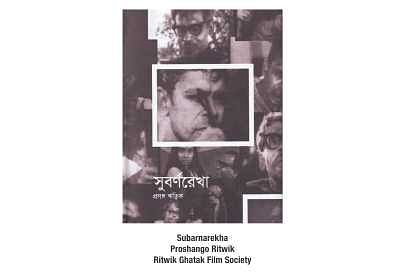The story of a movie man

Subarnarekha: Proshango Ritwik is a compilation of writings on Ritwik Ghatak, edited by Monis Rafiq, who was assistant director for the last film by Tareque Masud and survived that fatal accident because Tareq Masud told him to tie up the seat belt just five minutes before the mishap took place. This book was published by Ritwik Ghatak Film Society, Rajshahi, in December 2011. It introduces Ritwik and his works to readers in Bangladesh in a comprehensive way. There are 17 essays, 15 poems and 9 interviews on Ritwik, 6 interviews of Ritwik, along with 8 write-ups, 1 poem and 1 short story by Ritwik. There are, additionally, many photographs from Ritwik's great films in this 287-page book.
Write-ups on Ritwik are by Prateeti Devi, twin sister of Ritwik, who lives in Dhaka, Satyajit Ray, Mrinal Sen, Mahasweta Devi, who is the daughter of his elder brother Manish Ghatak, Hemanga Biswas, Jyotirmoy Roy, Sunil Gangopadhyay, Syed Salahuddin Zaki, Moinuddin Khaled, Sajedul Awal, Dr Mohammad Zainuddin, Dildar Hossain, Anwara Azad and three film society activists from Rajshahi. On Ritwik, there are interviews of Surama Ghatak, wife of Ritwik, Ustad Bahadur Khan, Baby Islam, Anil Chatterjee, Aroma Dutta, Badal Rahman, Shubhankar Ghatak, son of Ritwik's brother Ashish Ghatak, Habibur Rahman Khan, producer of Titas Ekti Nadir Naam, and Prabir Mitra, the protagonist in Titas.
Ritwik Ghatak, one of the greatest filmmakers in the global sense (whose parental home was in Bharenga, Pabna), was born in Dhaka in 1925, grew up in Rajshahi, left East Bengal as a result of the partition of India in 1947, wrote poems, short stories, plays, headed the Indian People's Theatre Association for some time and finally made films. All his films testify to his deep love for humanity and compassion for tortured souls and express the beauty of Bangladesh and the joys and sorrows of its people. Feeling the pains of the birth of Bangladesh, with Dhirendranath Datta, father-in-law, and Dilip Kumar Datta, brother-in-law of his twin sister Prateeti Devi, martyred in 1971, he told Aroma Datta, daughter of Prateeti, 'I belong to that soil.'
In an interview, talking about the connecting thread of Meghe Dhaka Tara, Komal Gandhar and Subarnarekha, his great films, he said in the regional language of Bangladesh, 'I wanted to bring together the two Bengals. I love these two, Mian, and I will keep saying it throughout my life and till my death. … Ritwik Ghatak can do that out here and in Dhaka.' Again, he said, 'I worked in two Bengals and am still working and no one did this more than I. No one knows more than I about that Bangla.'
Ritwik has made Bangladesh proud through Titas Ekti Nadir Naam, a great film based on the epic novel by Advaita Malla Burman. Hemanga Biswas wrote of Ritwik's fondness for folk songs in the original dialect of Purbo Bangla, now Bangladesh. According to Satyajit Ray, some influences of Hollywood entered the works of all his contemporaries in Bengali cinema. Only Ritwik remained free of it. He admits, 'It is still a mystery to me how it was possible.' And again he said, Ritwik was 'a lot more Bangali than I am'.
Prabir Mitra said in his interview, 'I have acted in many films, more than three hundred. But if anyone asks me, I say I have acted truly in only one film. And is Ritwik Kumar.'
Titas Ekti Nadir Naam was a challenge for him to finish, and he did it. He fell ill in Dhaka in 1973. Indira Gandhi, a personal friend of his, sent a special plane to take him away from here to India. Mrinal Sen and Surama Ghatak came and carried him away. Ritwik did another great film Jukti Takko Aar Gappo in 1974 and died in 1976. His early films Nagorik and Ajantrik are milestones in Bengali cinema. Some of his disciples are great film makers now across India.
Cinema became a magic wand in the hands of Ritwik and this to what extent can be understood from some incidents. Poet Bishnu Dey broke down in the hall with a cry when Udaytara uttered in Titas Ekti Nadir Naam, 'I won't stumble. I have a youthful body. I will go smoothly slipping down the alley.' Nita's heart-emptying utterance in Meghe Dhaka Tara, Dada, ami banchte chai (I want to live), has a crushing effect on many people, including Habibur Rahman Khan, who told Monis Rafiq that he was afraid of a heart attack at that moment and ran out of the hall. One is haunted by that unforgettable image of Supriya Devi, with that immortal cry reverberating through the universe.
Subarnarekha: Proshango Ritwik is like a gateway to Ritwik's life and films for Bengali readers anywhere in the world.
Alamgir Khan is Program Manager, Research and Development Collective (RDC)

 For all latest news, follow The Daily Star's Google News channel.
For all latest news, follow The Daily Star's Google News channel. 



Comments